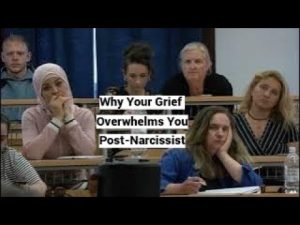Summary: Survivor Guilt in Narcissistic Abuse
Grieving in Relationships
- Women and men exhibit different behaviors when grieving; women tend to change appearance and sexuality, while men change location or vocation. This is a common understanding in grief counseling [00:00].
- Narcissistic abuse causes profound, complex grief, often needing dedicated healing resources [00:15].
Concept of Survivor Guilt
- Survivor guilt is defined as remorse for surviving catastrophic events others did not, including family members not suffering genetic diseases others have had, and those feeling they didn’t do enough to save loved ones [01:20].
- Survivor guilt stems largely from an exaggerated sense of responsibility for others’ well-being, common in people-pleasing, codependency, and borderline personality disorder [02:00].
- In the context of narcissistic abuse, survivor guilt manifests as feeling responsible for the narcissist’s happiness and believing survival equals failure or betrayal depending on who initiated the separation [02:40].
The Narcissist as a “Child” and the Fantasies Involved
- Narcissists are psychologically comparable to children (aged 2-3), with compromised memory and identity diffusion, creating the illusion of a child needing care [03:45].
- Leaving a narcissist feels like abandoning a vulnerable child, resulting in intense guilt and shame, amplified by nurturing instincts triggered in anyone, regardless of gender [04:20].
- However, this “child” is emotionally cruel and weaponized with adult capacities, making them dangerous despite the perceived vulnerability [04:55].
- The shared fantasy with the narcissist involves mutual commitment to a delusional narrative, which when broken, leads to feelings of guilt for betraying this narrative [03:10].
Relationship Dynamics and Psychological Impact
- Relationships with narcissists are battles for survival, characterized by gradual personal annihilation and absence of mutuality or reciprocity [06:15].
- The narcissist presents a false self, an absence masquerading as presence; they do not truly experience hurt but react with rage and fear when abandoned, fearing loss of their fantasy world [06:50].
- Your experience of abandonment is profound and painful, unlike the narcissist’s experience which is anxiety about losing their constructed false reality [07:40].
The Reality of Abandonment and the Narcissist’s Perspective
- Narcissists fear abandonment because it shatters their delusional self-concept and protective narratives, not due to genuine emotional pain [08:20].
- Your departure signifies the collapse of their fantasy, bringing them closer to psychological disintegration [08:50].
- You have not abandoned a real human or loving partner but a delusional story in which you were a character, trapped in a manipulative dynamic [09:30].
Acceptance and Moving Forward
- Survival is inevitable and not a betrayal; the fantasy was doomed and walking away was not a true choice but the end of an inevitable cycle [10:10].
- No amount of love or effort could have changed the narcissist or the fantasy; you were a manipulated participant, not a lover or caregiver [10:50].
- The narcissist is interchangeable in their manipulative cycle, seeking new victims with identical dynamics [11:45].
- Walking away is essential and represents reclaiming your true self, rather than continuing as a pawn in the narcissist’s fantasy [12:30].
Transcript Timestamp References:
- Start times of cited points refer to approximate moments in transcript where the concepts are introduced or elaborated.






